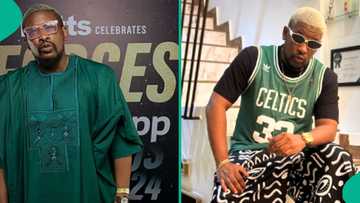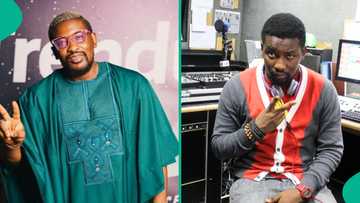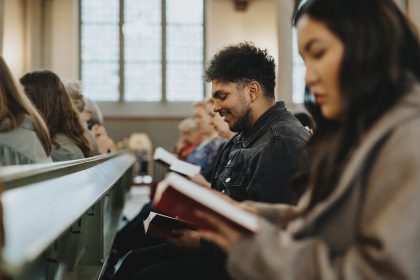From studying electrical engineering to becoming a leading voice in the African digital creative space while working with Google, Dolapo Amusat embodies the spirit of a clever visionary innovator. Speaking with LEGIT.ng, the multi-dynamic young Nigerian sheds light on how technology is impacting the creative sector, thereby creating a pool of opportunities amid globalisation.
You are a bird of many colours; what does your background look like?
I would say my background is slightly unconventional. I studied electrical engineering at the university and got into digital marketing and data analytics right after, but I’ve always been leading and executing creative projects and those skills simultaneously. I always was one of those people who could contribute an interesting perspective in almost any conversation, and I knew I’d most likely end up working in a complex or interdisciplinary field. Right now, I lead WeTalkSound, and I am also a product marketing manager at Google.

Read also
OAP Do2dtun gives career advice, talks about setting legacy: “If you’re young now, start now”

Source: Original
With your tech background, how did you get into the creative scene?
I have always explored creativity. I used to make music in university. I used to write poetry, too. I even won an award in my university for ‘Poet of the Year’. I think my love for music, in particular, just trumped everything I was interested in. I knew that no matter how deep the technical skills I learned were, I still wanted to connect them to music and creativity somehow.
PAY ATTENTION: Сheck out news that is picked exactly for YOU ➡️ find the “Recommended for you” block on the home page and enjoy!
How has tech shaped the way you’ve built and executed your projects?
Tech, especially digital, shapes the way I think the way I guide my team to think as well. I think the beauty of digital in the African context is that it has helped us leapfrog and access certain opportunities that we otherwise couldn’t. With a smartphone, internet access and certain tools, you can make magic and share that magic with the world. You can also go deeper by using stuff like analytics to explore your audience and trends and learn how to reach even more people. And most importantly, you can monetize whatever that is, whether it’s music, comedy, educational content and so on. So, we’re a very digital-native team and my unique background has really helped in understanding the new landscape in ways that most people don’t. That sets us apart.

Read also
Do2dtun explains bringing personal fights online: “Online activists would be few if justice worked”
What are some of the most exciting projects you’ve done with WeTalkSound?
First, WeTalkSound started really organically. There was no grand vision behind it at first. It was just a community for my friends and I to talk about music all day long. But like many things, it started to take a life of its own and I realized at some point that I was on to something novel and potentially very valuable, and then I started to be more intentional about how I handled it. I would say it was driven by my love and passion for music and creativity at first, and then I started to get validation from several corners and I knew I had to take it very seriously.
I work extensively with international and Nigerian artists and record labels like EMPIRE, Aristokrat Records, Joeboy, Lojay, Reminisce and more. And for them, we’ve worked mostly on digital marketing campaigns for their projects. We’ve also done a lot of curating and storytelling on African music and culture including documentaries like ‘Sounds of Nollywood’ which was showcased at the British Council as well as documentaries on artists like Bella Shmurda and Rose May Alaba. We also have a streetwear fashion brand and we curate events.

Read also
Jay On Air talks about career: “I don’t want to just burst out and forgotten after a short while”
In your experience, what are some of the challenges of the Nigerian creative industry?
I would say the biggest issues currently are macroeconomic factors affecting every sector in Nigeria and the people. The unstable exchange rate has drastically reduced the value of subscription fees and streaming earnings from the Nigerian audience. The inflation has also further reduced the purchasing power of Nigerians, so they prioritize essentials and entertainment takes the backseat.
Lack of structure is a significant concern as we do not have the necessary systems that will ensure that the industry creates and retains value and that value benefits the people and country. Infrastructurally, Lagos, Afrobeats’ epicenter is not even set up well to exploit all the opportunities from the cultural explosion it’s getting.
For entrepreneurs in the space, access to support and funding is also a major issue. Investors are slightly interested but not keen to write cheques yet, as they recognize the challenges the industry faces.

Read also
100+ timeless football quotes from your favourite stars
How have you navigated these challenges and contributed to solving them with your work so far?
My experience working in the corporate world around very structured businesses has helped craft my approach to building WeTalkSound in such an unstable business environment. We’ve figured out how to build a sustainable business with good fundamentals, making revenue and being profitable while scaling at same time.
As an expert, how do you think digital technology can help the industry as a whole develop even faster?
Improved access to the internet and digital skills will overall help the industry generate much more revenue from exporting our content and creativity, to markets with higher purchasing power. This will help empower many more creative Nigerians to make a good living off their abilities.
With tech, we can build more products to solve specific systemic issues in the industry such as project financing, insurance and pension for creatives, which are very critical but barely exist right now.

Read also
60+ The Lorax quotes from the Dr. Seuss’ famous franchise
What are some of your projections for the future of the Nigerian creative industry?
More creatives will find global audiences and be able to generate revenue in foreign currencies from their rooms. More global organizations will set up footprints in Nigeria and tap into our local talents, but we may not reap the benefits as a country if the stakeholders don’t put the right structures in place to retain value.
Source: Legit.ng



